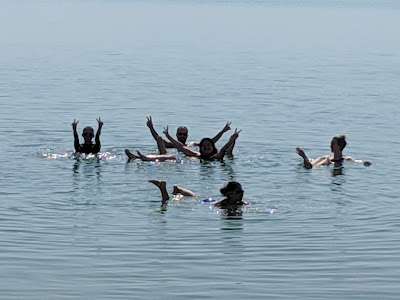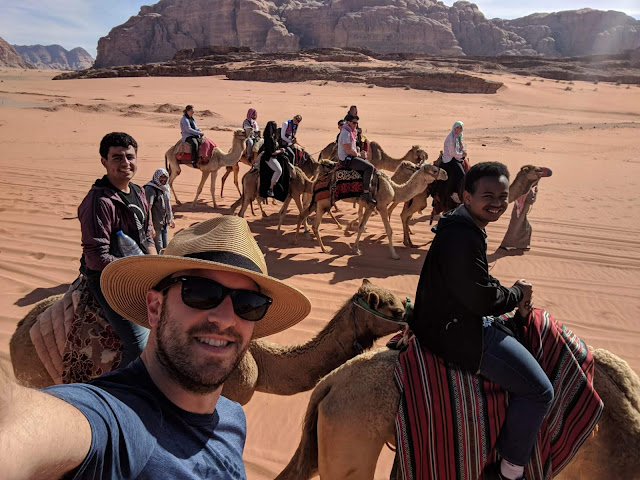Final thoughts
When we attended the party at Paul’s house last week, we met a very interesting Palestinian woman named Ruba, who has worked for UNRWA (the United Nations Relief and Works Agency) as a journalist. After exchanging contact information, she asked if we would like to visit a Palestinian refugee camp in Amman, and we jumped at the opportunity.
We met her for lunch, and then we took a 10 minute taxi ride to the camp. The word camp conjures up images of tents and/or temporary living situations; but this camp has been here for over 60 years. In fact it’s more of a very tightly crowded neighborhood. To our surprise we were able to walk right in--there were no walls or gates. Upon arrival Ruba’s stepfather welcomed us into the headquarters for the Al-Wehdat soccer team, where we sat in a room with about ten Palestinian men. Ruba told us that her stepfather had had trouble finding people who were willing to speak to us, as a lot of people are understandably suspicious of strangers coming to the camp and asking them questions, especially fearing potential repercussions if those questions were to become too political.
We were so grateful for the men who agreed to meet with us and gave us an extremely warm welcome. Ruba translated for us as they told their stories to us and argued with each other. Here are some highlights of our impromptu summit:
- They emphasized multiple times that they have no problems with us as Americans; it’s only our government’s policies that they disagree with.
- They often feel forgotten as other crises take over the attention of the international community; in addition, policies intended to help some groups often affect other groups in an unintentional but negative way.
- The situation of Palestinian refugees in Jordan is the best in the region because they are granted Jordanian citizenship. In other places the situation is much more difficult.
- They are painfully aware of how Palestinians are portrayed by the western media, specifically in the United States--“We’re not terrorists” one man explained--and they believe having face to face conversations with people is the best way to destroy these myths
- They love their soccer team! They told us that even when Al-Wehdat plays other Palestinian teams elsewhere, the local people will cheer for Al-Wehdat because it’s a such a source of Palestinian national pride.
After we spoke, Ruba’s stepfather and a small entourage of men led us around the camp. We witnessed trash on the streets (UNRWA, the UN organization responsible for services cannot afford to adequately provide them, as international funding has been cut) and apartments crammed together. Everywhere we looked we were confronted with the reality of life here: it is cramped, dirty, and the people need support.
And yet, there was also a vibrant energy to this place. Our new friends took immense pride in being our hosts. They encouraged us to take photos, and at the end of our tour they showed off their soccer team’s trophy room, the Room of Cups. The men greeted people everywhere they went, and there was a true sense of community. As we walked we were offered food and drinks (which we weren’t allowed to refuse!) and we posed for children who wanted pictures of us. We were treated like royalty and we weren’t allowed to pay for anything. This is the beauty of the people of the Levant. It doesn’t matter what they have. They want to share it with their guests.
| Sitting on the Zahal steps drinking tea. This used to be Ruba’s favorite spot for reading books. |
| Last meal in Jordan at Al Quds. We tried to eat all the food before we left. We failed (again). |
| People from all over Amman come to this street market in the camp because it is famous as a place to buy cheap goods. Resources and opportunities are limited or many people, and these carts are how they support their family or make ends meet. Unfortunately, the market is also illegal, and occasionally the Jordanian authorities do sweeps and shut it down. |
| This is karabeej halab. It is fried dough (reminded me of a churro) that has been drenched in syrup. This took several years off of my life and I’d do it again. |
| Boys and girls have separate schools in the camp, and there is an elementary, middle, and high school for each. As Jordanian citizens they can also attend government schools, but the costs associated with fees, materials and transportation make it prohibitively expensive for families. Because of a lack of oversight, many students end up leaving school early so they can help provide for their families. |
| Freshly made chips. Allie tried to refuse. Again, she failed. |
| A local boy asks if he can take a picture of us. We agree and make the same request to him. |
| In the trophy room of the Al-Wehdat soccer team. This is the closest Dave will ever come to raising a trophy. He took full advantage of the opportunity. They practically had to pry it out of his hands. |
| Our guides. Ruba’s stepfather is standing behind her, between Allie and Dave. |
Our final thoughts on the trip:
Travel is a challenge--cultural and language barriers, new places, new faces. There’s a reason why international travel can be an anxiety inducing endeavor.
Travel can also be a humbling. Arriving in a foreign land often forces us to confront our false preconceptions and cultural illiteracy. When truths are revealed it can be difficult to process--nobody wants to feel ignorant and we don’t like being wrong.
But travel can also be magical, exciting, and uplifting. Because travel is about discovery, learning, and connecting to people. And this can yield breathtaking results. We know how lucky we were to be given to opportunity to come to Jordan and Israel. Without the guidance and support of Teri Schrader, Wanda Schulman, and Jen O’Brien, and the relentless ambition of our students Matteo Carrabba and Avery Schmitz, we would not have had this life changing experience.
Jordan has surpassed all expectations, and going into this trip they were already quite high, thanks to our conversations with Ms. Schulman and Dr. O’Brien, and our countless phone calls and emails with organizations and people who have helped make Watkinson in Jordan a reality.
The Jordanian people take great pride in their hospitality, and it was on display at all times. We cannot tell you how many times we had total strangers walk up to us with a smile, ask where we were from, tell us how much they love Americans, and with an exuberant farewell proclaim: “Welcome to Jordan!”
We always felt welcome. We always felt safe. And we always felt an enormous sense of gratitude, astonishment, and wonder at everything that this place can be. Beautiful, HOT, delicious, cheerful, and really, really hot (this is why we will be back in March!).
When the school year begins we will present the upcoming Watkinson in Jordan trip to the community. The trip will occur during March break, and the goal is to bring 10 students, along with Dr. O’Brien and the two of us. As educators we are bursting at the seams with excitement for this trip, and for the curriculum that we will build for our students in preparation for our travels. This trip will have profound meaning for our students, as it did for us, and we cannot imagine a more impactful learning experience than to bring students to this place.


Comments
Post a Comment